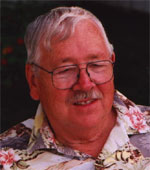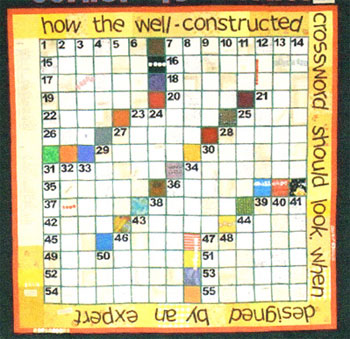
I find it as no surprise that an estimated 50 million American people each day work at solving a crossword puzzle, some even with ballpoint! My wife was a math teacher so I feel compelled to add this equation. There are about 300 million people living in the USA and about 21 hundred folks living in Minonk, so that means about 335 Minonkites work puzzles each day. Maybe these puzzlers should start a club. Get to know your neighbors, no?
History tells us that when archeologists started uncovering the ancient city of Pompeii that had been buried by an Mt Etna eruption in about 79AD, they found examples of early puzzles called "word squares".
A simple example of this is: A larger 10 by 10 square word puzzle with definition clues would ask you to discover the appropriate words and arrange them in both directions to read correctly. A bit complicated, no?
In December 1913, the New York World news paper's Sunday edition printed its first puzzle called Word-Cross designed by Arthur Wynne. A copy of the original puzzle and word clues is shown here. The paper then carried a new puzzle each week and by 1924 these puzzles were published into a puzzle book by Simon & Schuster. Early "crossingword" puzzles were called "form", a simple geometric shape filled with words. Some forms were square, diamond, hexagonal and diamond.
Readers of some of Daniel Brown's books, "Angels and Demons", and "The Di Vinci Code" will see how his use of symbols and word codes are used like a puzzle to enhance his story. Yes there is a bit of controversy here!
Now back to early puzzlers, or solvers who called themselves Cruciverbalists. One researcher named Leila Abboud tells how puzzling became a mania in New York City. She reports that the City Library began limiting the use of their dictionaries to 5 minutes per person and that dictionaries were placed in commuter train cars for the people to use. Cottage industries sprang up producing clothing and jewelry related to cross wording. One item of interest was a small dictionary that could be worn like a wristwatch!
Each year, in the spring, the American Crossword Puzzle Tournament is held in Stamford, Connecticut. This year Tyler Hinman, a 20 year old college student became the champion. Solvers are asked to work 8 original puzzles created for the event. They are graded on speed and accuracy. A $4000 prize is given.
Another organization is the National Puzzlers League that is dedicated to word play and puzzles. It was originally founded in 1883 and publishes a magazine called "Enigma".
My wife is a quilter, as well as a puzzler, so I am including this story and picture. Recently, a 6ft by 6ft hand made quilt displaying a "workable" crossword puzzle with clues and answers on the back. This was auctioned off on ebay and received $1776 that was given to a charity. The design was a 15 by 15 square that is standard in the US.

The 13 by 13 square form is more prevalent in England. Odd numbered squares seem to work out better, as there is a "center" square. "St. Martin-in-the-Field" church related group located in Cambridge, England provides puzzlers with "over the net" free religious puzzles whose themes cover all the books of the Bible. You can access these at: http://www.smitf.org.uk/
Time for a little trivia. PNEUNMONOULTRAMICROSCOPIC SILICOVOLCANOCONIOSIS is a "made up" medical word meaning: A lung disease caused by silica dust.
"An old chestnut" is a puzzle repeated so often it makes people groan at seeing it again.
Do you know what they say to a person with a really big vocabulary? Absolutely nothing!
There are several other types of puzzles called "jumbles, word searches, cryptics and acrostics, but I prefer those standard squares printed in the LA Times, New York Times and the Washington Post. There are many "themed" puzzles featuring birds, bees, math, song lyrics, little kids and classroom use. There are Anagrams that can be simple or hard. An example: using the word TEA GUARD, rearrange the letters to spell GRADUATE. Or, MYCAR, which aptly becomes CAMRY.
In case you would like to construct your own puzzle, use these suggestions:
Use lively or known words, not obscure ones. Limit the use of 4 letter words
Give accurate clues Have a minimum of 72-78 total words
Have a theme, not too clever List your name as author
Use very few blacked out squares
It has been reported that the New York Times paper will pay $75 per daily puzzle 15 by 15 square. You can also get more advice on the computer. www.cruciverb.com
Some of the more successful writers are: Merl Reagle, Mary Derderian, Roger Squires, Eugene Maleska, Michael Doran, and my favorites, Sylvia Bursztyn and Barry Tunic.
Finally! I believe using ink is a sign of smugness, my eraser is my friend. I only use computer "spell check" when I write stories, I prefer a couple of crossword dictionaries to help me. At my age, I am not afraid to admit I might even look up an answer or two. I close with this gem, "Puzzles are considered insightful and emanate from someone wiser than oneself, but eventually end up being useless newsprint and don’t do you a lick of good."